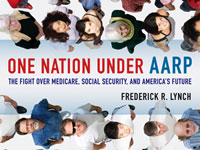Staying Fit
Ten years ago Frederick R. Lynch started work on a book about the graying of boomers — the generation of 70 million-plus Americans born from 1946 to 1964, who are just now beginning to reach retirement age. Lynch, a professor of government at Claremont McKenna College in Southern California, started out with two questions:
- With the decline of traditional pensions and the uncertainties of the stock market, would boomers be able to save enough for retirement?
- As aging boomers became eligible for Medicare, would the financially squeezed program be able to meet their health care needs?


Join the fight to protect Social Security and Medicare.


AARP Membership— $12 for your first year when you sign up for Automatic Renewal
Get instant access to members-only products and hundreds of discounts, a free second membership, and a subscription to AARP the Magazine.
Those questions loomed ever larger for boomers when the Wall Street meltdown savaged their savings and forced many of them to postpone their retirement plans or even withdraw funds from retirement accounts to cover health care bills and other living expenses.
In searching for answers, Lynch became convinced that boomers would do well to band together politically to protect the programs they will sorely need.
How could the generation deeply instilled with a "do your own thing" ethic and a corresponding distrust of authority and institutions possibly do that?
Freelance journalist Patrick J. Kiger tried to find out when he talked to Lynch about his new book, One Nation Under AARP: The Fight Over Medicare, Social Security, and America's Future.
AARP has been around for a long time, but you've focused on its relationship with the boomers. Why?
Back in the late 1990s I had seen this wonderful PBS Frontline documentary, Betting on the Market, which looked at how heavily dependent boomers had become upon the markets and mutual funds to pay for their retirement. Near the end, someone raises the question of what would happen if, when it came time for the boomers to retire, the market went through a protracted downturn and they lost all that money they'd been counting on. What would they do?
That started me thinking about the boomers and their psychological characteristics. Would they become the stereotype of greedy geezers? Or would they become the greatest political force we'd ever seen?
How did that lead you to AARP?
I went to Washington and started talking to people at a lot of different institutions, but I discovered that AARP was the only one that was really studying the boomers and thinking about them. So I started going to AARP events and watching the mating dance between the organization and its new clientele. That's when I shifted to looking at how these two major forces — the boomers and AARP — would come together.
Athough boomers are this enormous demographic group, why aren't they nearly as powerful and influential as they should be?
They haven't formed a voting bloc, at least not yet. There are a lot of political differences among them, and they haven't unified around their interests. They tend to be individualistic, and to distrust institutions.
And there's been a dearth of leadership. When I would ask people in Washington, who's going to be our Claude Pepper [Pepper, who died in 1989, championed the rights of older Americans in a political career that spanned 60 years], all I got were blank stares.

































































More From AARP
What You Need to Know About the Coronavirus
The latest news on COVID-19 and answers to frequently asked questions